On Demand Series
– virtual assemblies, family nights & cultural music
classes –
Assemblies/Family Nights
Assemblies and Family Nights feature fun and engaging
hands-on learning for the whole family.
|
Story
Reading and Music
|
|
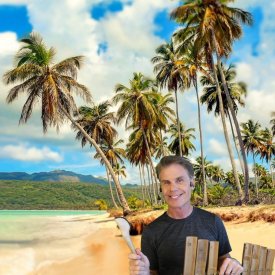 |
Math and Music – geometric shapes, fractions, and patterns – At the Math and Music presentation, you'll learn how to play popular hand drum rhythms from West Africa, and how to create your own drum patterns using Phil's on-line drum machine. In addition, you'll hear Phil's five favorite fractions with a musical journey around the globe. Along the way, you'll hear instruments and songs from Indonesia, China, Ghana, Mexico, and the Caribbean. Phil will also show you some of his geometric-shaped instruments, and teach you how to fold those shapes into an origami popper for a music making activity! Check out Phil's video on his five favorite fractions: https://youtu.be/LqCQIaF8_mY
|
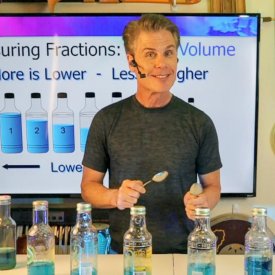 |
Homemade
Music – math and measurement – In Homemade Music, Phil demonstrates all of his wacky homemade instruments, and shows the students how to transform common household items into musical marvels using math and measurement! Phil features straw oboes, sprinkler pipe panflutes, and water bottle xylophones, along with his online follow up activities. Before the presentation, please have on hand: an empty soda can, or an empty water bottle. This will be used to make a homemade shaker to play rhythm games together during the program! Check out Phil's YouTube video on measuring liquid volume to make and play a water bottle xylophone: https://youtu.be/-T8M2Ld7DP8
|
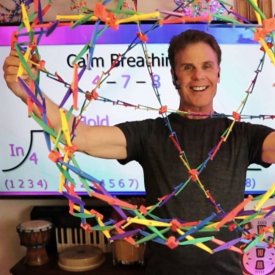 |
Journey through the Mind – mindfulness, brain science, and social/emotional skills – In Journey through the Mind, Phil begins with an entertaining musical exploration of the brain, focusing on vision, hearing, emotions, memory, and movement. Then he leads the kids through a series of fun activities on imagination, patterns, and memory games. Throughout the program, Phil shows the students his mindfulness breathing exercises for emotional balance, focused listening, and successful learning. You can see a YouTube video of one of Phil's breathing exercises here: https://youtu.be/zD0d0Bf8rRc
|
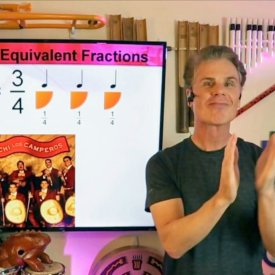 |
Math and Mariachi – pie fractions, equivalency, and syllables – In Math and Mariachi, your families participate in an Aztec percussion group and perform musical phrases written in Nahuatl (pronounced naw-wa-tul), the language of the Aztecs. But first, they learn how musical rhythms are based on equivalent fractions—from traditional Mariachi folk songs from Mexico, to popular selections by Los Lobos and Carlos Santana. After that, the kids make their own homemade shakers and join together for an exciting concert of Aztec rhythms and indigenous melodies from ancient Mexico! Here's a sneak preview of this presentation: https://youtu.be/i2oIKt7rjAQ
|
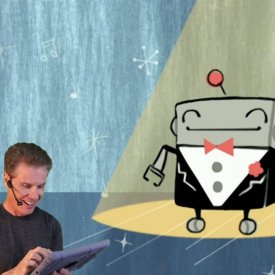 |
Math, Science and Sound – energy, sound waves, measurement and science experiments – Phil's dynamic presentation on Math, Science and Sound integrates math songs, hands-on experiments, mobile apps, and fun technology tools. He uses a sound cannon to show how mechanical energy moves the air to make sound. He also demonstrates how energy can be converted into multiple forms by transmitting sound over a beam of light using a flashlight and a solar cell. Finally, he shows the students a variety of fun scientific experiments they can do at home with just a smart phone! Check out Phil's demonstration on how we use math to measure high and low sounds, or frequency: https://youtu.be/QLkc7BzHjI0
|
Cultural Music Classes
Cultural Music Classes explore diverse cultures through
music, language, and interactive drumming activities.
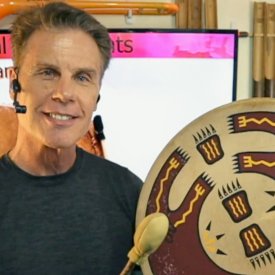 |
Indigenous Music of North America – cultural music and drumming activity – Phil's presentation on Indigenous Music of North America explores the music and customs of three Native American cultures: the Yokut, the Chippewa, and the Ute. He demonstrates the musical instruments they played, and the rhythms and songs they created. After that, he brings it all together with a fun interactive drum class for the students. Before the presentation, please have on hand: an empty soda can, or an empty water bottle. This will be used to make a homemade shaker to play rhythm activities during the program! |
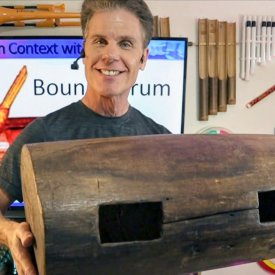 |
Drum Language in Ghana and the
Congo – cultural music and drumming activity – In Phil's cultural music class on Drum Language, students learn how cultures in Ghana and the Congo communicate using rhythms. They visit an elementary school in Ghana and hear how drum language is part of their school day. They also visit the Congo and hear actual Lokele drummers communicate using rhythmic patterns. Your students will read, sing, and play along with Phil as they participate in this fun and highly interactive activity. Before the presentation, please have on hand: a can or water bottle, and a pencil. This will be used as a homemade drum during the program! Here's one of the drumming activities on the Congo: https://youtu.be/Q4H7vwm2m3g |
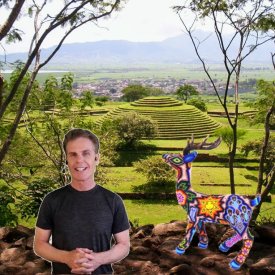 |
Music of Mesoamerica – cultural music and drumming activity – In Music of Mesoamerica, your students explore the cultures that made up the Aztec and Mayan empires. They learn about the musical instruments they played and the songs they sung. After that, the kids make their own homemade shakers and join together for an exciting concert of Aztec rhythms and indigenous melodies from ancient Mexico! Before the presentation, please have on hand: an empty soda can, or an empty water bottle. This will be used to make a homemade shaker to play rhythm games together during the program! |
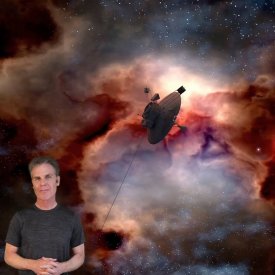 |
Morse Code Music – patterns, communication, and history – In Morse Code Music, Phil shows how language and patterns are used to communicate over long distances. From the covered wagon days of the 1800's, to modern-day messages sent into space, Phil shows how we have digitized our alphabet into a code that we can read, hear, and now play as music! Your students will visit the Voyager spacecraft and experience images and diverse languages on NASA's Golden Record. They will also make a homemade musical instrument and join Phil in playing his Morse Code Mambo song! Before the presentation, please have on hand: a card, and a comb or brush. Check out a portion of this exciting presentation: https://youtu.be/N7R3FMTO_GU |
| Get Pricing Info |